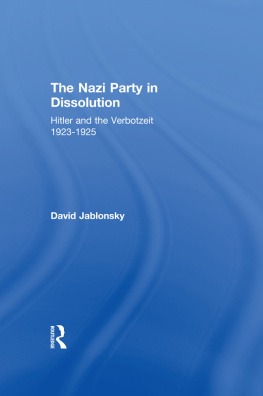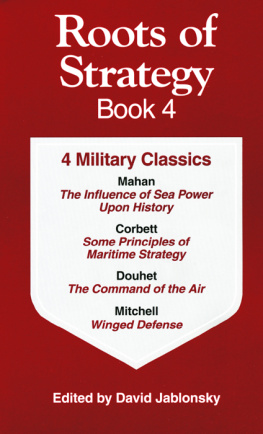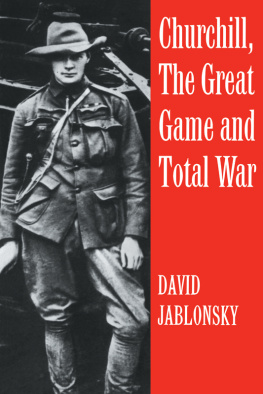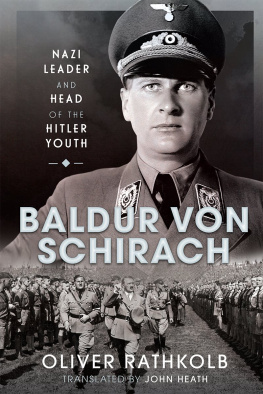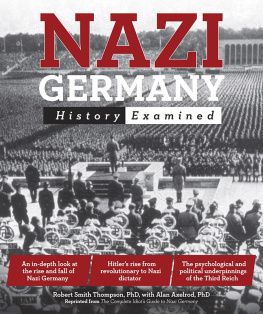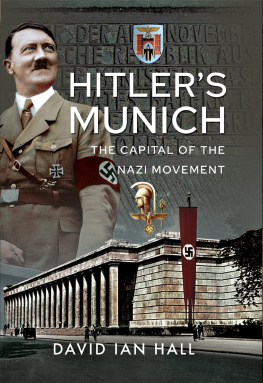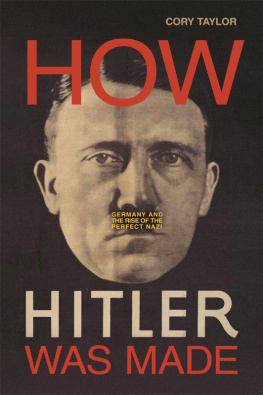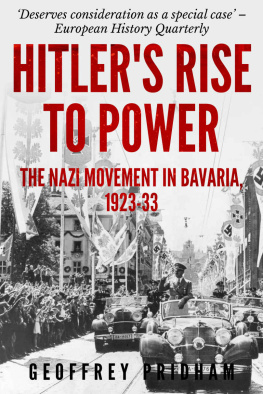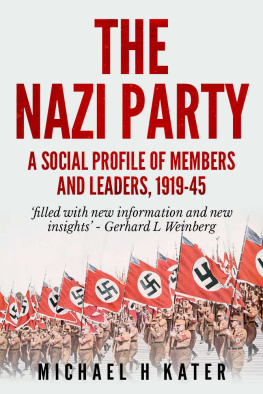Cass Series on Politics and Military Affairs in the Twentieth Century
The Nazi Party in Dissolution
CASS SERIES ON POLITICS AND MILITARY AFFAIRS IN THE TWENTIETH CENTURY
Series Editor
MICHAEL I. HANDEL
U.S. Army War College,
Carlisle, PA
Leon Trotsky and the Art of Insurrection 19051917
H.W. Nelson
Soviet Military Deception in the Second World War
David M. Glantz
The Nazi Party in Dissolution: Hitler and the Verbotzeit 19231925
David Jablonsky
War, Strategy and Intelligence
Michael I. Handel
Cossacks in the German Army 19411945
Sam Newland
First published in 1989 by
FRANK CASS AND COMPANY LIMITED
This edition published 2013 by Routledge
2 Park Square, Milton Park, Abingdon, Oxon OX14 4RN
711 Third Avenue, New York, NY 10017
Routledge is an imprint of the Taylor & Francis Group, an informa business
Copyright 1989 David Jablonsky
British Library Cataloguing in Publication Data
Jablonsky, David
The Nazi Party in dissolution : Hitler and
the Verbotzeit 19231925.
1. Germany. Political parties. National-
sozialistische Deutsche Arbeiter-Partei,
19231925
I. Title
324.243038
ISBN 0-7146-3322-4
Library of Congress Cataloging-in-Publication Data
Jablonsky, David.
The Nazi Party in dissolution : Hitler and the Verbotzeit, 19231925 / David Jablonsky.
p. cm.
Bibliography: p.
Includes index.
ISBN 0/7146/3322/4
1. Nationalsozialistische Deutsche Arbeiter-Partei. 2. Hitler, Adolf, 18891945. 3. GermanyPolitics and government19181933.
I. Title.
DD240.J3 1989
324.24303809dc19
88-20324
CIP
All rights reserved. No part of this publication may be reproduced, stored in a retrieval system, or transmitted in any form, or by any means, electronic, mechanical, photocopying, recording, or otherwise, without the prior permission of the publishers.
The Verbotzeit refers to the period beginning 9 November 1923 and ending 16 February 1925 in which the National Socialist German Workers Party (NSDAP) was banned in Bavaria. The banning of the NSDAP and other rightist organizations was not unique in Germany. That process had begun as a reaction to the rightist violence which was spawned in the political chaos of post-war Weimar Germany and reached a peak with the assassination of the German Foreign Minister, Walther Rathenau, on 24 June 1922. There stands the enemy, Chancellor Joseph Wirth stated in the Reichstag the day after that assassination. And there is no doubt; this enemy stands on the right.
By the fall of 1922, the NSDAP was banned in Prussia, Saxony, Baden, Thuringia, Schaumburg-Lippe, Mecklenburg-Schwerin and Hamburg. The trend continued in early 1923 in Bremen and Hessen, and in March of that year the Supreme Court in Leipzig upheld not only the dissolution of the NSDAP in all areas where it had occurred since 1922, but the banning of the party newspaper, the Vlkischer Beobachter , as well.
Bavarias attitude in this period toward the NSDAP was influenced by its particularistic tendencies and its general political orientation. After 1871, Bavaria retained several key privileges and functions including the retention of the Wittelsbach monarchy, postal and railway control and the sharing of tax administration with the Reich. All this was eliminated with the Weimar Constitution. Even more disadvantageous from the standpoint of the leaders of a state which was traditionally conservative was the increased linkage of the Weimar constitution with a government primarily sponsored by the Social Democrats. In addition, there was the Bolshevist TTireat, an obsession in Bavarian politics growing out of that states experiences with Kurt Eisners Soviet Bavarian Republic which existed from 8 November 1918 until it was crushed by North German troops and counter-revolutionary Bavarian paramilitary units on 1 May 1919.
The result of these developments was an intense conservative backlash throughout Bavaria in 1920 and 1921 led by the States Minister President, Gustav von Kahr, an anti-Republican monarchist, and Ernst Phner, the Munich Police Chief. Kahrs rise to power had been primarily due to his influence over the Bavarian Einwohnerwehr , an anti-Marxist, home guard milita, and a temporary volunteer group known as the Zeitfreiwilligenkorps. Consequently, when the national government was pressured by the Allied Powers to eliminate these organizations as a violation of the Versailles Treaty disarmament clauses, Kahr refused to obey, stating that in this Bavaria will continue on her way even at the cost of the temporary separation of Bavaria from the Reich.
The Lerchenfeld government, which replaced that of Kahrs over this incident, continued Kahrs particularistic course and refused to followthe Reichs new law in the summerof 1922. On 24 July 1922, it passed an emergency ordinance for Bavaria which, in effect, invalidated the national Law for the Protection of the Republic in that state.
Despite this latter provision, the compromise was not popular in Bavaria, and rightist agitation against the agreement resulted in the replacement of Lerchenfeld by Eugen von Knilling on 8 November 1922. In this atmosphere, it was not surprising that the new Bavarian government refused to follow the Reichs ban on the NSDAP. By the beginning of 1923, then, that party was flourishing in Bavaria as were most organizations within what was known as the vlkisch movement.
Vlkisch was a much more comprehensive term for Germans than its literal root, Volk or people implied. Since the birth of
After World War I, the term vlkisch came to mean all things to the diverse right wing forces in Germany. Only rarely had there been a concept that appeared to imply so many associations and create so many possibilities and meanings. For many, it was an almost spiritual means for resisting and overcoming the evils of industrialization and the atomization of modem man. For the old ruling cliques of conservatives and professional military, it was justification for the preservation and restoration of the autocracy and vested interests inherent in a return to the status quo ante bellum. And for the youth as well as ex-soldiers, the vlkisch concept offered the promise of a classless community of equals, sustained by an aggressive and exclusive nationalism. Most importantly, for the vast majority of the German right after World War I, vlkisch ideology was an admixture of anti-Semitism and German superiority linked through various concepts of race and blood. This appears to be the most sensible approach since there is no English word adequate to convey all the characteristics of the word.
It was in this vlkisch milieu early in 1923 that Adolf Hitler began to establish himself as the dominant figure in the NSDAP. This auspicious beginning, however, was cut short. Less than a year later as a result of an aborted putsch, Hitler was in prison and his party dissolved and banned in Bavaria, the ideological heart of the Nazi movement. The Verbot would last 16 months.

